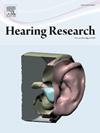Sentence recall and neurophysiological effects of the “2-Sentence Problem” under time compression in younger and older listeners
IF 2.5
2区 医学
Q1 AUDIOLOGY & SPEECH-LANGUAGE PATHOLOGY
引用次数: 0
Abstract
Understanding how auditory cognitive load impacts speech recognition is critical for improving communication strategies across the lifespan. This study investigated the effects of two auditory cognitive load factors – sentence count (one vs two sentences) and speech rate (natural vs time-compressed) – on delayed sentence recall in younger and older listeners with normal and near-normal hearing. Forty participants (20 younger, M = 21.15 ± 1.18 years; 20 older, M = 64.50 ± 6.19 years) completed a sentence-recall task under four conditions combining sentence count and speech rate. Neural and physiological responses were recorded using systemic physiology augmented functional near-infrared spectroscopy (SPA-fNIRS). Participants also provided subjective workload ratings (NASA-TLX) and completed assessments of working memory and temporal processing speed. Results showed that increased sentence count and faster speech rate significantly reduced recall accuracy, with older adults being more negatively affected, particularly under time compression. Higher working memory capacity was associated with better performance on two-sentence conditions, and better temporal processing speed supported time-compressed sentence recall in older listeners. Younger adults demonstrated strong premotor cortex activation during listening, while older adults had weak premotor cortex activation isolated to the higher-load conditions, consistent with possible compensatory strategies and reduced neural efficiency. Galvanic skin response suggested blunted reactivity in older adults under increased load. Subjective workload ratings reflected greater perceived effort in older adults, particularly during time-compressed conditions. These findings highlight age-related differences in cognitive and neurophysiological responses to auditory load and emphasize the importance of multimodal approaches for understanding effortful listening.
时间压缩条件下青年和老年听者“两句题”的句子回忆及神经生理效应
理解听觉认知负荷如何影响语音识别对于改善整个生命周期的沟通策略至关重要。本研究调查了两种听觉认知负荷因素——句子数(一个句子vs两个句子)和语速(自然语速vs压缩语速)对听力正常和接近正常的年轻听众和老年听众延迟句子回忆的影响。40名参与者(年轻20人,M = 21.15±1.18岁;年长20人,M = 64.50±6.19岁)在句子数和语速相结合的四种条件下完成了句子回忆任务。使用系统生理增强功能近红外光谱(SPA-fNIRS)记录神经和生理反应。参与者还提供了主观工作量评分(NASA-TLX),并完成了工作记忆和时间处理速度的评估。结果表明,句子数增加和语速加快显著降低了记忆准确率,老年人受到的负面影响更大,尤其是在时间压缩的情况下。更高的工作记忆容量与两句话条件下更好的表现有关,而更好的时间处理速度支持老年听众的时间压缩句子回忆。年轻人在听力过程中表现出强烈的运动前皮层激活,而老年人在高负荷条件下表现出较弱的运动前皮层激活,这与可能的代偿策略和降低的神经效率相一致。皮肤电反应提示老年人在负荷增加时反应迟钝。主观工作量评分反映了老年人更大的感知努力,特别是在时间紧迫的情况下。这些发现强调了听觉负荷的认知和神经生理反应的年龄相关差异,并强调了多模态方法对理解努力倾听的重要性。
本文章由计算机程序翻译,如有差异,请以英文原文为准。
求助全文
约1分钟内获得全文
求助全文
来源期刊

Hearing Research
医学-耳鼻喉科学
CiteScore
5.30
自引率
14.30%
发文量
163
审稿时长
75 days
期刊介绍:
The aim of the journal is to provide a forum for papers concerned with basic peripheral and central auditory mechanisms. Emphasis is on experimental and clinical studies, but theoretical and methodological papers will also be considered. The journal publishes original research papers, review and mini- review articles, rapid communications, method/protocol and perspective articles.
Papers submitted should deal with auditory anatomy, physiology, psychophysics, imaging, modeling and behavioural studies in animals and humans, as well as hearing aids and cochlear implants. Papers dealing with the vestibular system are also considered for publication. Papers on comparative aspects of hearing and on effects of drugs and environmental contaminants on hearing function will also be considered. Clinical papers will be accepted when they contribute to the understanding of normal and pathological hearing functions.
 求助内容:
求助内容: 应助结果提醒方式:
应助结果提醒方式:


